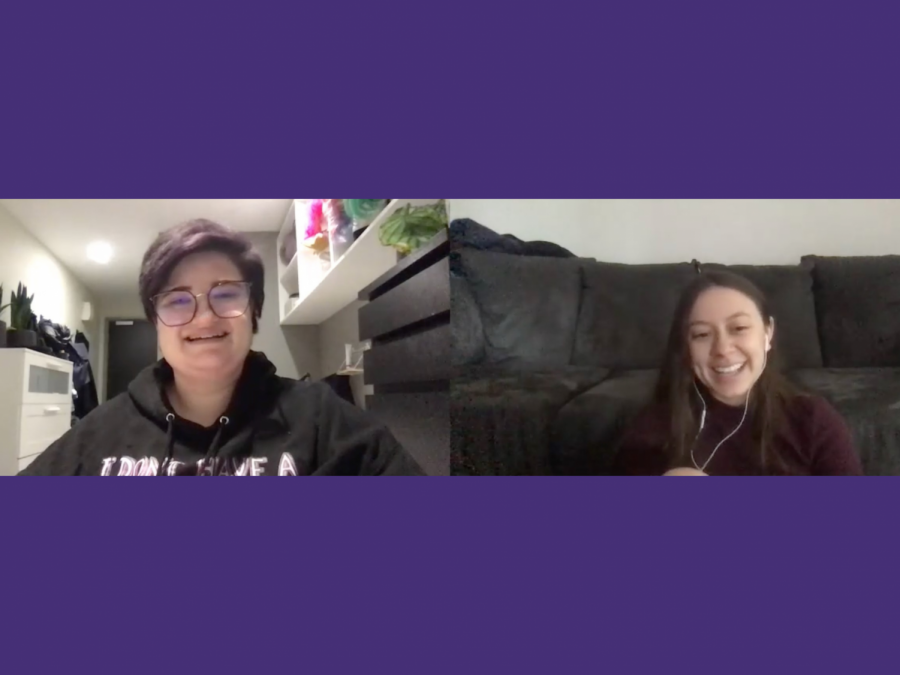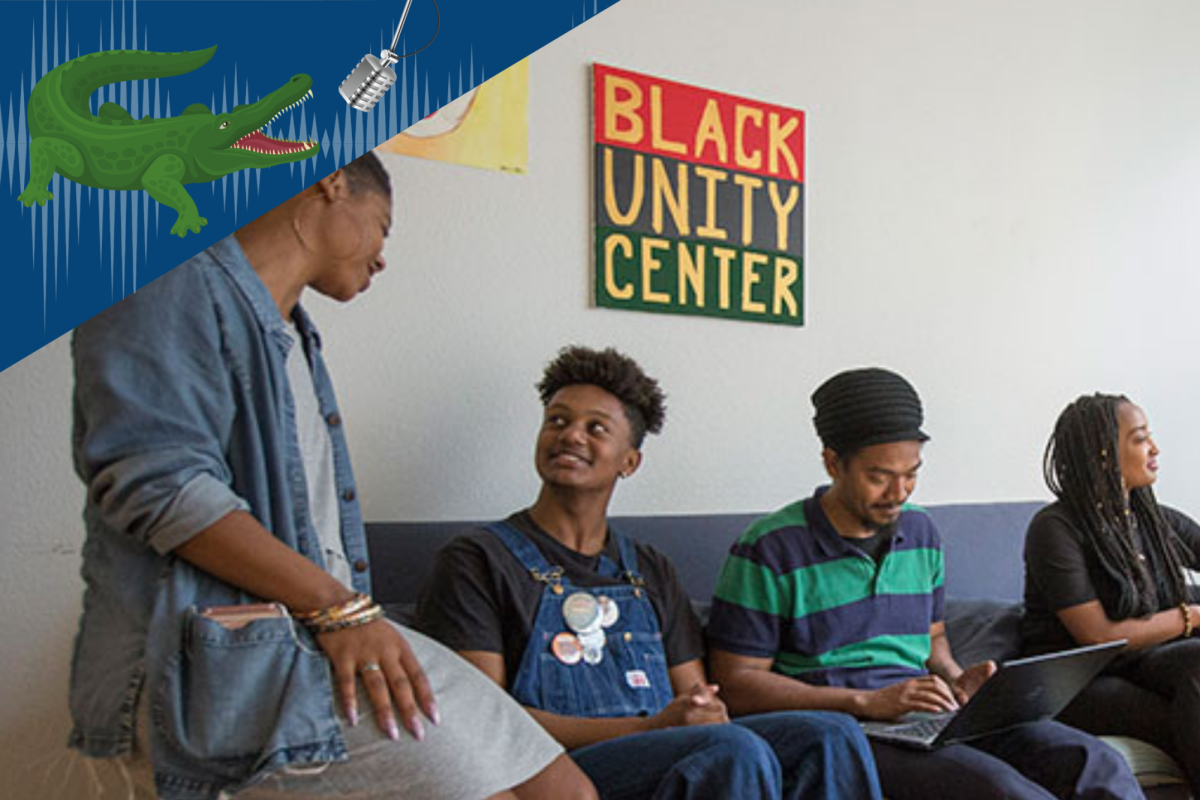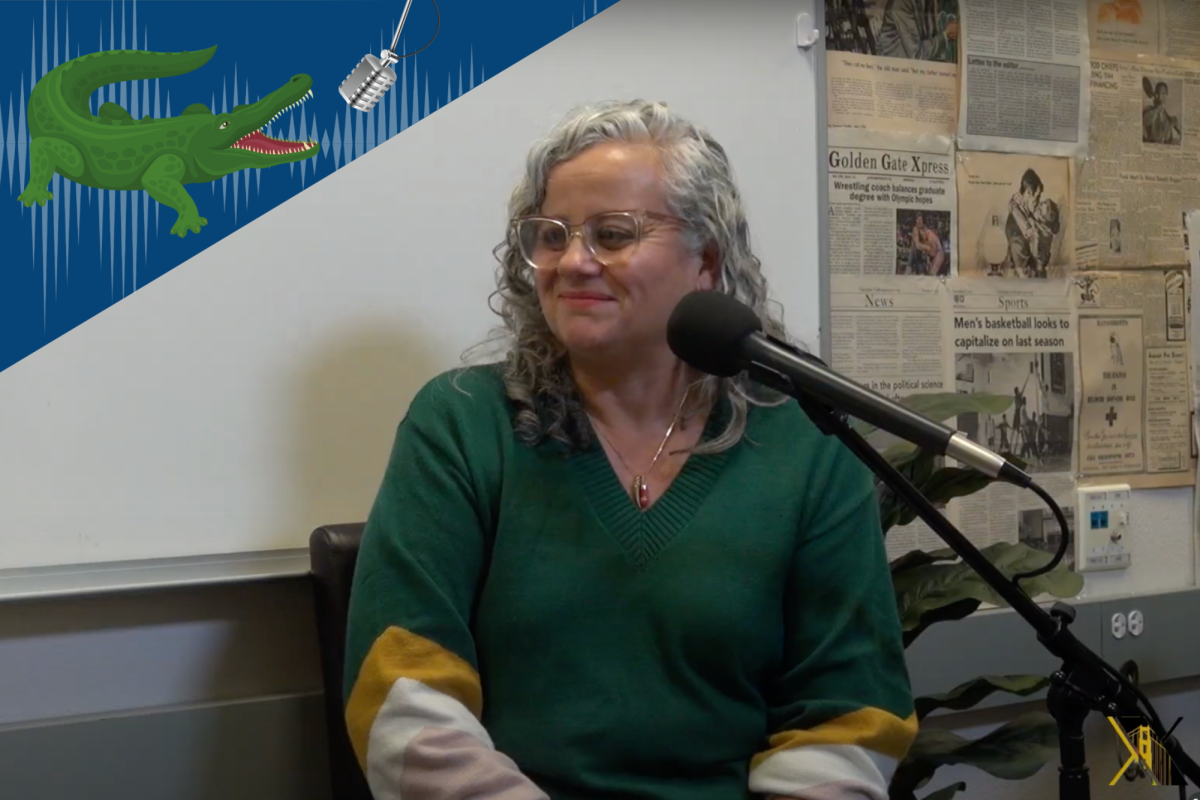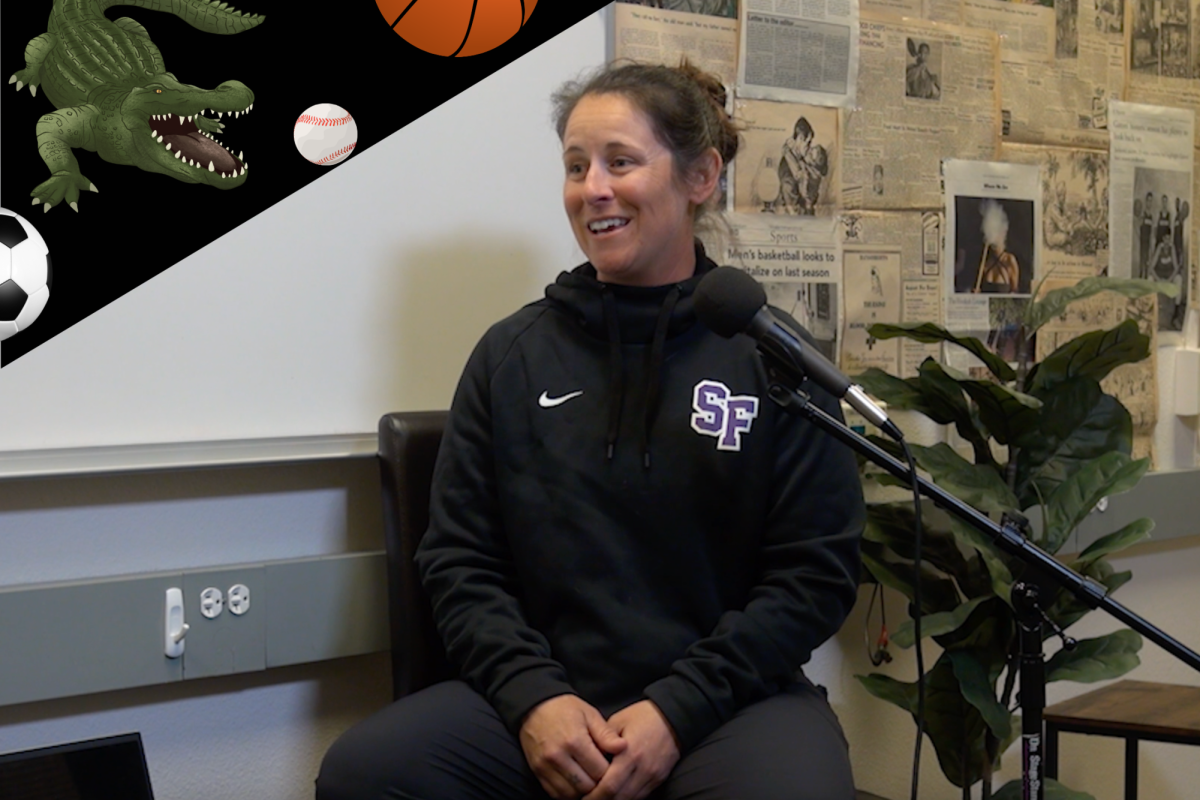Welcome to Gator Talk, a collaborative CalState podcast that brings city and statewide perspectives to SF State news.
In Gator Talk’s sixth episode, host Sebastian shares the main story spot with Golden Gate Xpress campus new reporter; Sydney Vargas. She conducted an interview with Karla Beauty Marx about Endometriosis Week.
TRANSCRIPT:
Intro
*salsa song fades in*
Seb: This is Sebastian Mino-Bucheli, I’m your multimedia editor and your host for Gator Talk, a Golden Gate Xpress podcast that brings news to SF State students.
For more information/coverage, check out goldengatexpress.org OR @GatorTalkPod on all social media platforms.
Preview of the show
Seb: Here’s a quick preview of the show.
I’ll be updating the audience with a quick news brief with news that happened this week that matters to SF State students.
City reporter, Syd Vargas will be joining in for the main story.
News brief
Seb:
-It’s Women History Month!
-Quick COVID headlines
-Texas and Mississippi have ended the national mask mandate in their states.
-San Francisco is now in the Red Tier, but that doesn’t mean that the COVID-19 isn’t over! Keep on double masking, California.
-Mayor London Breed announced that the F-Line streetcar will be back in May and cable cars on the Hyde Line will be back in the fall
Seb: That’s it for the news brief!
I’m going to pass the microphone on to Sydney Vargas.
Sydney will set up the main story.
Main Story
Syd: Hi all, this is Sydney Vargas, a staff reporter here at Golden Gate Xpress.
Well, it is March and besides basketball, there are also important weeks that are deserving of our attention. This week was Endometriosis Awareness Week but,
What is Endometriosis?
Endometriosis is a disease that affects 1 in 10 people. Yet, getting diagnosed with pelvic disorder is no easy task, the process can take anywhere from four to 11 years, according to an article published in 2019 by the American Journal of Obstetrics and Gynecology.
It is common for someone with endometriosis to lose years of their lives due to misdiagnosis and improperly managed and incorrectly treated pain.
Not only is it culturally deemed normal to have a bit of pain while menstruating, but it is also common that pain associated with uteruses are belittled by doctors – especially if those people are people of color and, or non-gender conforming.
In 2014 ENDOMETRIOSIS, the UK, the main provider of information and support for endometriosis in the United Kingdom, founded Endometriosis Awareness Week. Similar efforts have been attempted here in the States, pretty recently.
On Feb. 24, Reps. David Scott and Jenniffer González-Colón introduced Resolution Designating March 2021 as Endometriosis Awareness Month.
Congresswoman Jenniffer González-Colón said “Endometriosis is a life-long condition that affects close to 7 million women in the U.S. It can cause chronic pain, infertility, and other serious health issues. Raising awareness is key to helping the women who struggle with this condition every day.”
While awareness is great some people with endometriosis still feel unseen and excluded by these efforts.
While I was scrolling through Twitter on the #EndometriosisAwareness tag, I reached out to many users tweeting out about their experience, but one particular tweet caught my attention.
Happy #EndometriosisAwarenessMonth. As a non-binary person with endo, please remember to use gender neutral language when discussing it. Not all people with endo are women
— Karla Beauty Marx (@karlabeautymarx) March 1, 2021
It was a tweet from Karla Beauty Marx, a drag queen based currently in London.
It read, “Happy Endometriosis Awareness Month. As a non-binary person with endo, please remember to use gender-neutral language when discussing it. Not all people with endo are women.”
So, I gave them a ring.
Marx: I think it’s really harmful to use such binary gender language Firstly because not all women have uteruses. So woman’s problems? What is a woman’s problem like, some women have penises and like that’s just part of life? So it’s harmful, not when it’s so harmful because it ends up excluding a huge group of people who have gynecological issues who have PCOs, who have endometriosis.
Syd: Marx’s said that it took them around 7 years of living with endometriosis before getting it officially diagnosed by their current gynecologist. That is one year more than the average 8 years it takes to be diagnosed in the UK with endometriosis.
While definitions and scientific explanations of endometriosis give people an understanding of its symptoms, survivors are able to put words to endometriosis flare-ups that scientific journals can’t because they are the ones experiencing them.
Marx: I think the worst part of it is like you can’t stop, it doesn’t really matter what painkillers you take. It’s not going to stop until your body decides to stop it. But it honestly feels like I had a gallstone a few years ago and I didn’t most and then got pancreatitis, and most people end up in the hospital from that. And I did not because I liked my pain threshold was just like, Okay well that’s it was really sore, but I thought it was bad reflux. Because I’ve already got acid reflux was like, Oh, it’s bad acid reflux. Not so much. And when I saw my gynie, she was like, Well, yeah, that’s the thing with endo patients is your pain threshold gets really high. But that’s also a problem because doctors don’t listen to you when your pain threshold is very high to get ready. Because of what most people experience as eight on the pain spectrum. Someone with endo may experience a six. And doctors aren’t listening, but it’s individual as to how you experience it, you know?
Syd:
At the time of their first appointment they had a small understanding and hunch that it could potentially be endo.
Marx:
So I definitely had heard about it. By the time I went to the first gynie I saw, but I didn’t know a lot about it. I hadn’t researched a lot, but I didn’t know about it. And when I mentioned it to her, she’s like, no, you definitely don’t have it because I can’t see it on the scan.
Whereas when I went to the second doctor, I wasn’t sure it was right. I’d been told I didn’t have it so I was like, Okay, well I don’t know what this is. And then she was like it’s no, there’s no like there’s no chance it’s not. and then When the progesterone started looking for it, she was like, it’s yeah, we have proof. Like, don’t worry about it. But yeah, I assumed it wasn’t that by the time I’d seen her, because if one doctor told me it wasn’t, why would I think it was.
Syd: Marx’s misdiagnosis elongated the pain of their endometriosis, but also sometimes forced them into uncomfortable highly gendered spaces. They said that gynecology offices often are extremely feminine and maternal. Their current doctor’s office is fairly gender-neutral which plays a crucial role in their healing.
Marx: The space is very comfortable. It’s like, very, very comfortable, it’s relaxed, and there’s nothing very, like overly girly, or she’s got like some quotes on the wall and like, cute stuff, but that’s just her personality. Now it’s very like yoga-like Zen-like breathing in and out. Not like butterflies and princesses. And, you know, whereas the first gynie now had pictures of babies everywhere. And I think what does help is that this gynecologist that I see doesn’t do obstetrics at all anymore. She just deals with gynecological issues. And I think that helps a lot.
Syd: Marx is a champion for gender-neutral language in health because to them the binary in health literally limit’s the science and actively harms patients.
Marx: I mean, the amount of non-binary and trans people I know will trans men I know who won’t go to the doctor, to a gynecologist is unbelievable. And like I have spoken to people who after 10 years went to the first gynie checkup. And that’s just dangerous. Like, there are so many risks out there, and you do need to be checked.
Marx: And it’s also important to know, because testosterone, I mean, I’m not on T, but I know that people who are T are affected differently by endo. And a lot of doctors don’t understand how to handle that. And I think that it’s really important for people on Hrt to be recognized and basic research into it, because I think, in general, these little research into endometriosis, like, every few months, something else pops up, and you’re like, Oh, that’s great. Like, of course, something else terrible about it. But there’s even more for people who are now hormones and have different interactions with it.
Syd: Marx’s tweet was intentional. They are constantly advocating and happy to educate people because so few people know about endometriosis and may be suffering from it.
Marx: I went up there was one night I was in drag, and I wanted to corset and I literally physically couldn’t. Because my cause endo belly is a thing. And you get a really, really bloated side and someone was like, are you like Are you sure? Because a lot of my friends like you usually wear a corset, like “Why aren’t you?” and I was like, “oh no like my endo is too bad.” And they were like, “what’s that?” I was like oh it’s endometriosis And they explained and also like a 20 something year old woman had never heard before. “You’re a queer woman” like what?
Break
Seb: We’re going to take a quick break
Support the Golden Gate Xpress’ work by signing up for our online newsletter, following us on Instagram or Twitter @ GGXnews, and visiting the website: https://goldengatexpress.org
Interested in advertising with GGX? Check out our advertising page on goldengatexpress.org/advertising.
break ends –
Main Story, cont.
Syd: After talking to Marx, I wondered what services on campus are available for students if they feel that they are experiencing endometriosis.
I interviewed the lead physician of SF State’s Student Health Services, Dr. Allan Lee, over email.
I asked him if the Student Health Services can diagnose or treat endometriosis.
Dr. Lee: While patients with endometriosis classically complain of pelvic pain (including menstrual pain and pain when having sexual intercourse), this complaint by itself is not diagnostic of endometriosis. Other classic symptoms include infertility and a pelvic mass (which both aren’t common complaints from college students) In a study of 1,000 women with endometriosis about 80% present with pain PAUSE 25% with infertility PAUSE and 20% with a mass. The definitive diagnosis of endometriosis requires a biopsy performed during surgery, which is often performed by a specialist. Diagnosis of symptoms are usually vague and they overlap with a lot of other gynecologic and gastrointestinal conditions. Surgery has some inherent risks as well, and hence a usual delay in diagnosis from 7-12 years has been reported in the literature.
Specialists (as opposed to primary care physicians) are the medical professionals who usually treat endometriosis. Since endometriosis can affect numerous parts of the body, different specialists may have to work together in certain cases to manage this condition.”
Syd: He said, “When in doubt, reach out. As medical professionals, we advise patients to seek help for whatever issue is of concern to them – nothing is considered “too small” to ask. We always spend time educating our patients to help them understand their bodies better. It is our job as medical providers to figure out what’s going on, but we are unable to help if someone does not reach out and seek help.”
End
Syd: And that was the episode.
This was Syd Vargas, city reporter from Golden Gate Xpress and guest host for Gator Talk.
New episodes will premier Friday mornings so stay tuned.
Happy Women’s History Month.
And with that, I’m signing off.

















